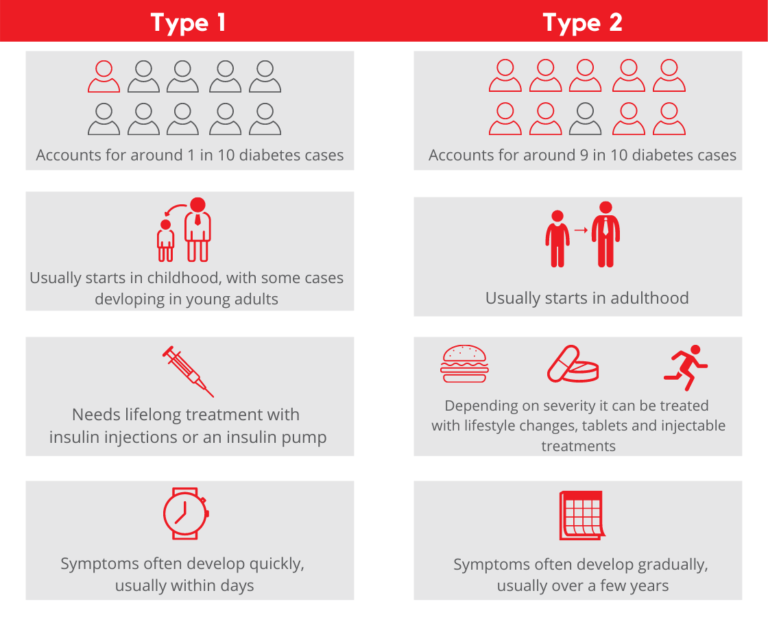What is Diabetes
Living with diabetes
Diabetes is a condition in which a person can have a high level of blood glucose (sugar) which if not brought under control can negatively impact quality of life.
Think of high blood glucose levels like really sticky sugary blood. This stickiness means that your blood can get stuck when it gets to small vessels (like those in your feet and eyes). When blood gets stuck it clots and the part of the body that was supposed to get this blood can be damaged.
When this sticky blood gets trapped in larger vessels you are at risk of heart attacks (where parts of your heart do not get enough blood), strokes (where parts of your brain do not get enough blood) and heart failure (where your heart does not pump blood out very well). Risk is higher when combined with high Cholesterol (think of lumps of butter or lard blocking your blood vessels along with sticky blood) and high blood pressure.
Source: Diabetes UK
Types of Diabetes

Types of Diabetes

TYPE 1 – This is where a person’s body produces cells that damage the pancreas (the organ that produces insulin to reduce sugar in the blood) and so cannot manage their own blood sugar. Type 1 diabetes most commonly occurs at a younger age.
TYPE 2 – This is where a person’s body becomes resistant to insulin. This is usually linked to increased weight (or waist circumference) and low levels of exercise.
The problems of Type 2 diabetes can affect different parts of your body.
Are you ready to
lead a healthier and active life?
Diabetes education programmes can help you to improve your knowledge and skills and also help you take control of your condition and self-manage it effectively.
The Spirit Hub gives people with diabetes a great place to easily book an appropriate course online.
Tips For Managing Your Diabetes
Stop smoking
If you smoke or use tobacco, STOP! Local services can help you as the health benefits start immediately and last a lifetime. Smoking not only causes cancer, it also makes your diabetes worse
Monitor your feet and hands
If checked regularly further damage may be prevented to your feet and your eyes. You should have both reviewed by the health service every year. If in doubt contact your local healthcare professional to arrange a review.
Flu vaccine
In autumn get a yearly vaccination. Being vaccinated last year won’t protect you this year. Getting a flu vaccination doesn’t give you the flu but can protect you from it.
Exercise a little more
Walking a few more steps (10%) each day could make a difference, reducing your blood glucose (sugar).
Use blood glucose test results
If you test, make sure you understand how to use the result; if not then you are pricking yourself with little benefit.
Take your medication
If you are prescribed medication, take it, if not you are risking your health. If you are worried about taking your medication speak to your doctor or nurse.
Reduce your blood pressure
Eat less salt, exercise regularly and eat more fruit and vegetables.
Eat sensibly
Eat fresh food (not pre-packaged) where possible. Eat five fruit or vegetable portions per day. Count your calories to understand how much you actually eat and if this is right for you.
Reduce your blood fat levels
Eat less fat, exercise a little more and take your medication. If you smoke, ask for help to stop.
Sensible alcohol consumption
No more than 10 standard drinks a week. Do not forget to count the calories from your alcohol into your daily intake.



